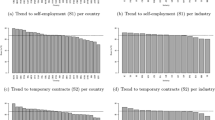Abstract
This article introduces the theme of the special issue, linking current concerns in European social and industrial relations policy with the research traditions covered byAI & Society. Human centredness, skill and technology, and the central importance of education and learning are emphasised as we build new development coalitions.
Similar content being viewed by others
References
Ainger A., Kaura R. and Ennals R. (1995)Executive Guide to Business Success through Human-Centred Systems. Springer-Verlag, London.
Benson I. (1986) (ed.)Intelligent Machinery: Theory and Practice. Cambridge University Press, Cambridge.
Bradshaw D.C.A. (1995) (ed.)Bringing Learning to Life: The Learning Revolution, the Economy and the Individual. Falmer Press, Brighton.
Brodner P. (1990)The Shape of Future Technology: The Anthropocentric Alternative. Springer-Verlag, London.
Brusco S. and Solinas G. (1997)Competitiva e Participazione: Un istituto per il lavoro per promuovere un modello di relazioni industrali basato sulla cooperazione. Il Mulino, Bologna.
Commission on Public Policy and British Business. (1997)Promoting Prosperity: A Business Agenda for Britain. Vintage, London.
Community Development Foundation. (1992)Press Enter: Information Technology in the Community and Voluntary Sector. CDF, London.
Cooley M. (1987)Architect or Bee? Hogarth Press, London.
Dearing R. (1997)Higher Education in the Learning Society. HMSO, London.
Demarco R. (1996)Kunst=Kultur, Art=Wealth. Adam Smith Lecture, Fife College 1995. Kingston Business School.
Eijnatten, F. van.(1993)The Paradigm that Changed the Work Place. Social Science for Social Action: Towards Organisational Renewal 4. Van Gorcum, Maastricht.
Ennals R. (1986)Star Wars: A Question of Initiative. John Wiley, Chichester.
Ennals R. (1987) (ed.)Artificial Intelligence State of the Art Report. Pergamon Infotech, London.
Ennals R. (1991)Artificial Intelligence and Human Institutions. Springer-Verlag, London.
Ennals R. (1995)Executive Guide to Preventing IT Disasters. Springer-Verlag, London.
Ennals R. (1997)Enterprise Culture: The Role of Festival. Presented at conference “Steiner, Art and Science: A City Responds” Dundee August 1997
Ennals R. and Gardin J-C. (1990) (eds)Interpretation in the Humanities: Perspectives from Artificial Intelligence. British Library, London.
Ennals R. and Gustavsen B. (1998) (eds)Work Organisation and Europe as a Development Coalition. Dialogues in Work and Innovation. John Benjamins, Amsterdam (forthcoming).
Ennals R. and Johansson A.L. (1995) (eds)The Future of Work, Technology and Knowledge. Kingston University, Kingston.
Ennals R. and Molyneux P. (1993) (eds)Managing with Information Technology. Springer-Verlag, London.
Gill K. (1986) (ed.)Artificial Intelligence for Society. John Wiley, Chichester.
Göranzon B. (1992)The Practical Intellect: Computers and Skill, UNESCO and Springer-Verlag, London.
Göranzon B. (1995) (ed.)Skill, Technology and Enlightenment: On Practical Philosophy. Springer-Verlag, London.
Göranzon B. and Florin M. (1990) (eds)Artificial Intelligence, Culture and Language: On Education and Work. Springer-Verlag, London.
Göranzon B. and Florin M. (1991) (eds)Dialogue and Technology: Art and Knowledge. Springer-Verlag, London.
Göranzon B. and Florin M. (1992) (eds)Skill and Education: Reflection and Experience. Springer-Verlag, London.
Göranzon B. and Josefson I. (1998) (eds)Knowledge, Skill and Artificial Intelligence. Springer-Verlag, London.
Greenwood D. and Gonzales Santos J. (1993) Industrial Democracy as Process: Participatory Action research in the Fagor Cooperative Group of Mondragon. Social Science for Social Action: Towards Organisational Renewal 2. Van Gorcum, Maastricht.
Gregory D. (1996) Action Research and Trade Unions: Some Experience from the UK.Concepts and Transformation 1(2/3).
Gustavsen B. (1992) Dialogue and Development. Social Science for Social Action:Towards Organisational Renewal 1. Van Gorcum, Maastricht.
Gustavsen B., Hofmaier B., Philips M.E. and Wikman A. (1996) Concept-driven Development and the Organisation of the Process of Change: Anevaluation of the Swedish Working Life Fund.Dialogues on Work and Innovation 3. John Beniamins, Amsterdam.
Gustavsen B. (1996) Is Theory Useful?Concepts and Transformation, The New Organisation of Work: 1(1).
Hammer M. and Champy J. (1993)Reengineering the Corporation. Harper, New York.
Handy C. (1994)The Empty Raincoat. Hutchinson, London.
Hillman J. (1996)The University for Industry. Institute for Public Policy Research, London.
Hutton W. (1995)The State We’re In. Cape, London.
Johansson A.L. (1995)The Swedish Model. National Institute for Working Life, Stockholm.
Josefson I. (1996) Practical Traditions of Knowledge among Physicians.Concepts and Transformation 1(2/3).
Lomax P. (1996) (ed)Quality Management in Education: Sustaining the Vision through Action Research. Routledge, London.
Masuda Y. (1990) (ed.)Human-Centred Systems in the Global Economy. Springer-Verlag, London.
McPherson M. (1995)Executive Guide to Speech-Driven Computing Systems. Springer-Verlag, London.
Miliband D. (1990)Technology Transfer. Institute for Public Policy Research, London.
Negrotti M. (1991) (ed.)Understanding the Artificial. Springer Verlag, London.
Oakley B. and Owen K. (1987)Alvey: Britain’s Strategic Computing Initiative. MIT Press, London.
Ranson S.M. (1994)Towards the Learning Society. Cassell, London.
Rosenbrock H. (1989)Designing Human Centred Technology. Springer-Verlag, London.
Toulmin S. and Gustavsen B. (1996) (eds) Beyond Theory: Changing Organisations through Participation.Dialogues on Work and Innovation 2. John Benjamins, Amsterdam.
Toulmin S. (1996) Is Action Research Really “Research”?Concepts and Transformation 1(1).
Toulmin S. (1997)An Action Research course for NGO staff: proposal to Skebo research conference, Stockholm, May 1997.
Author information
Authors and Affiliations
Corresponding author
Rights and permissions
About this article
Cite this article
Ennals, R. The new organisation of work: Building coalitions. AI & Soc 11, 155–165 (1997). https://doi.org/10.1007/BF02812445
Issue Date:
DOI: https://doi.org/10.1007/BF02812445




